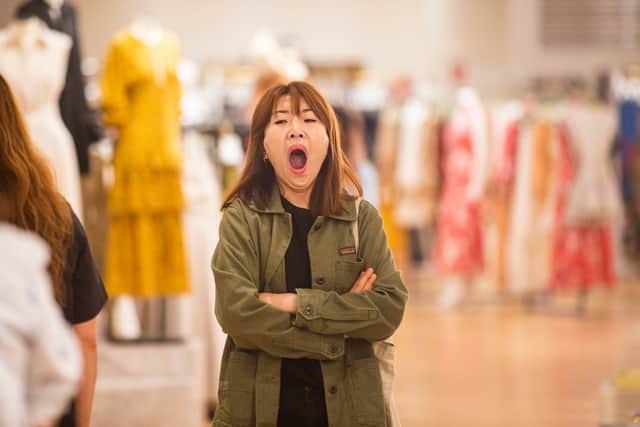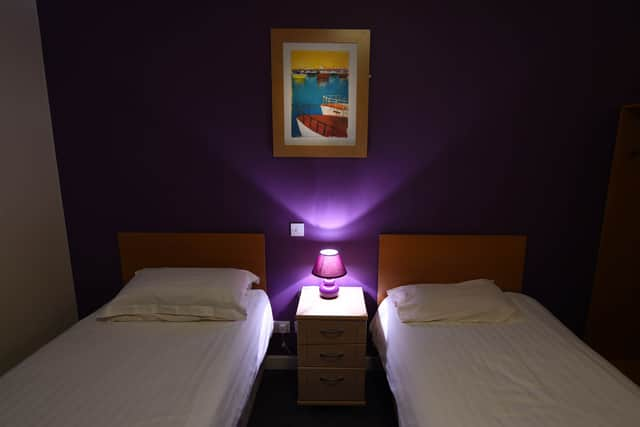What is insomnia? Meaning, signs, symptoms, causes, treatments explained - and what is new NHS app Sleepio
and live on Freeview channel 276
A new sleeping app designed to help people with insomnia has been recommended by the National Institute for Health and Care Excellence (Nice).
Sleepio, which offers patients a six-week treatment programme, will help reduce the need for sleeping pills, which can have many side-effects.
Advertisement
Hide AdAdvertisement
Hide AdIt’s also hoped to save money for the NHS which has been under huge strain in the wake of the Covid-19 pandemic.
Insomnia, which is thought to impact one in three people in the UK at some point in their lives, causes trouble getting to and staying asleep.
The condition often leaves patients exhausted and unable to concentrate throughout the day.
Here’s everything you need to know about insomnia and the new app that is expected to help.
Advertisement
Hide AdAdvertisement
Hide AdWhat is insomnia?
Insomnia is a sleep disorder that is thought to impact one in three people in the UK at some point in their life.


The condition makes falling asleep or staying asleep difficult, meaning people who suffer from it never feel like they have got the rest they need.
There are two types of insomnia, acute and chronic.
Acute insomnia is when your sleep is impacted for a short period of time, usually with a specific cause and sleep improves once that issue has been rectified.
Chronic insomnia lasts for at least three nights a week for three months. It does not always have a definite cause and leaves you feeling exhausted.
Advertisement
Hide AdAdvertisement
Hide AdIf you start to experience insomnia, it’s important to tackle it before the issue becomes chronic.
What are the symptoms of insomnia?
The main symptoms of insomnia is the inability to either fall asleep or stay asleep.


People will often find themselves lying awake at night, or will wake up early in the morning and be unable to get back to sleep.
Anyone suffering from insomnia will wake up still feeling tired and unrested, they can often struggle with fatigue and find it difficult to concentrate during the day.
Symptoms of insomnia according to the NHS include:
Advertisement
Hide AdAdvertisement
Hide Ad- Find it hard to go to sleep
- Wake up several times during the night
- Lie awake at night
- Wake up early and cannot go back to sleep
- Still feel tired after waking up
- Find it hard to nap during the day even though you’re tired
- Feel tired and irritable during the day
What causes insomnia?
There are many things that cause a person to develop insomnia.
Common causes associated with insomnia are anxiety, stress and depression, but there are also medical conditions that can make getting to sleep hard, such as allergies or chronic pain.
Other causes of insomnia according to the NHS can include:
- An uncomfortable bed
- A bright sleeping area
- A room that is too hot or too cold
- Alcohol or nicotine
- Recreational drugs
- Shift work
- Jet lag
How is insomnia treated?
Acute insomnia can generally get better with simple changes to your sleep habits.
Things such as avoiding screen time one hour before bed, creating a relaxing bedroom environment and undertaking gentle exercise, can all help you drift off easier.
Advertisement
Hide AdAdvertisement
Hide AdNatural ingredients like lavender or chamomile can also create a soothing environment.
Insomnia can also be treated with medication from your pharmacist or GP, or you may be referred to cognitive behavioural therapy (CBT).
Sleeping pills are only often prescribed for chronic insomnia and this would be for short-term use only.
The NHS has also released an app to help people with insomnia called Sleepio.
Advertisement
Hide AdAdvertisement
Hide AdWhat is the new NHS app Sleepio?
The Sleepio app measures a patient’s sleep using an artificial intelligence (AI) algorithm to give them an overall sleep score.
Patients will undertake a six week self-help programme, which involves a weekly sleep test and keeping a daily sleep diary and will be offered CBT tailored to their sleep needs.
Nice has predicted that the app will save money on prescriptions for sleeping drugs like zopiclone and found that it reduced overall health costs.
People will have access to the programme for 12 months and will be able to complete the sessions at their own pace and the app can be linked to your fit bit or Apple watch.
Advertisement
Hide AdAdvertisement
Hide AdJeanette Kusel who is the acting director for MedTech and digital at Nice said: “Until now people with insomnia have been offered sleeping pills and taught about sleep hygiene, so our committee’s recommendation of Sleepio provides GPs and their patients with a new treatment option.”
She added: “This is a good example of where a digital health technology can help the NHS.
“The evidence has shown using Sleepio reduces the number of GP appointments people with insomnia need and will also cut the number of prescriptions for sleeping pills delivered by pharmacists.”
Comment Guidelines
National World encourages reader discussion on our stories. User feedback, insights and back-and-forth exchanges add a rich layer of context to reporting. Please review our Community Guidelines before commenting.
